Essay - Legal and Ethical Principles in Healthcare.
VerifiedAdded on 2022/09/14
|11
|2788
|165
AI Summary
Contribute Materials
Your contribution can guide someone’s learning journey. Share your
documents today.
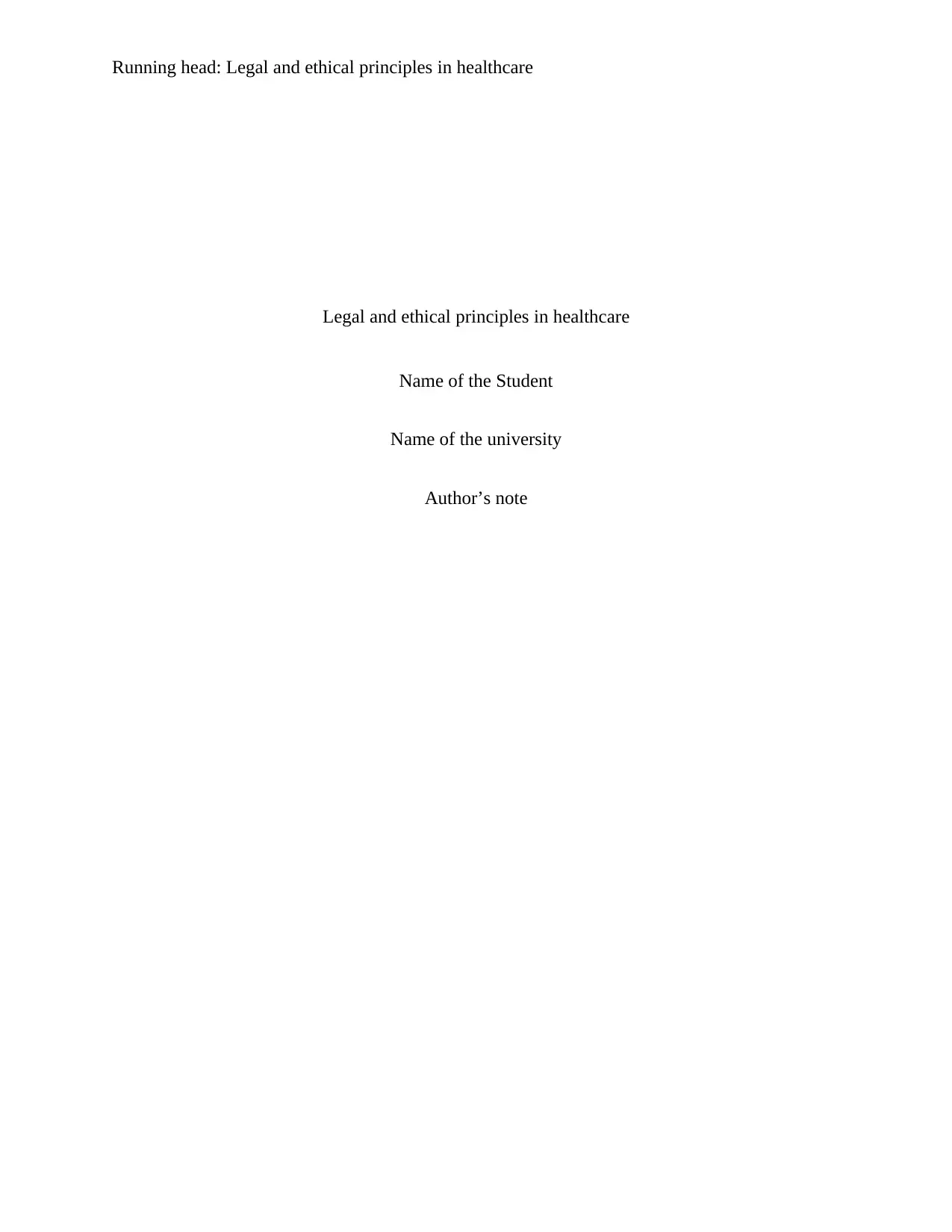
Running head: Legal and ethical principles in healthcare
Legal and ethical principles in healthcare
Name of the Student
Name of the university
Author’s note
Legal and ethical principles in healthcare
Name of the Student
Name of the university
Author’s note
Secure Best Marks with AI Grader
Need help grading? Try our AI Grader for instant feedback on your assignments.
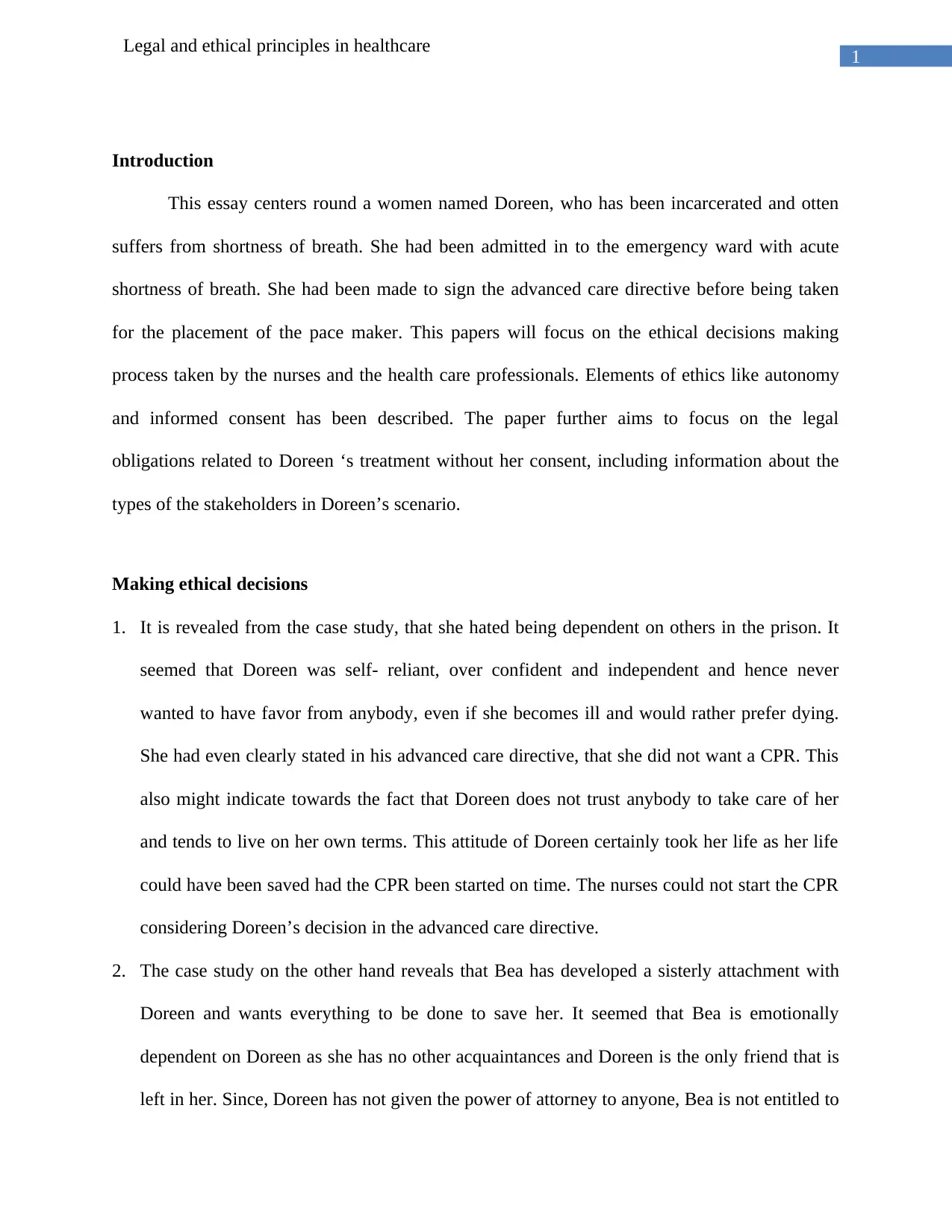
1
Legal and ethical principles in healthcare
Introduction
This essay centers round a women named Doreen, who has been incarcerated and otten
suffers from shortness of breath. She had been admitted in to the emergency ward with acute
shortness of breath. She had been made to sign the advanced care directive before being taken
for the placement of the pace maker. This papers will focus on the ethical decisions making
process taken by the nurses and the health care professionals. Elements of ethics like autonomy
and informed consent has been described. The paper further aims to focus on the legal
obligations related to Doreen ‘s treatment without her consent, including information about the
types of the stakeholders in Doreen’s scenario.
Making ethical decisions
1. It is revealed from the case study, that she hated being dependent on others in the prison. It
seemed that Doreen was self- reliant, over confident and independent and hence never
wanted to have favor from anybody, even if she becomes ill and would rather prefer dying.
She had even clearly stated in his advanced care directive, that she did not want a CPR. This
also might indicate towards the fact that Doreen does not trust anybody to take care of her
and tends to live on her own terms. This attitude of Doreen certainly took her life as her life
could have been saved had the CPR been started on time. The nurses could not start the CPR
considering Doreen’s decision in the advanced care directive.
2. The case study on the other hand reveals that Bea has developed a sisterly attachment with
Doreen and wants everything to be done to save her. It seemed that Bea is emotionally
dependent on Doreen as she has no other acquaintances and Doreen is the only friend that is
left in her. Since, Doreen has not given the power of attorney to anyone, Bea is not entitled to
Legal and ethical principles in healthcare
Introduction
This essay centers round a women named Doreen, who has been incarcerated and otten
suffers from shortness of breath. She had been admitted in to the emergency ward with acute
shortness of breath. She had been made to sign the advanced care directive before being taken
for the placement of the pace maker. This papers will focus on the ethical decisions making
process taken by the nurses and the health care professionals. Elements of ethics like autonomy
and informed consent has been described. The paper further aims to focus on the legal
obligations related to Doreen ‘s treatment without her consent, including information about the
types of the stakeholders in Doreen’s scenario.
Making ethical decisions
1. It is revealed from the case study, that she hated being dependent on others in the prison. It
seemed that Doreen was self- reliant, over confident and independent and hence never
wanted to have favor from anybody, even if she becomes ill and would rather prefer dying.
She had even clearly stated in his advanced care directive, that she did not want a CPR. This
also might indicate towards the fact that Doreen does not trust anybody to take care of her
and tends to live on her own terms. This attitude of Doreen certainly took her life as her life
could have been saved had the CPR been started on time. The nurses could not start the CPR
considering Doreen’s decision in the advanced care directive.
2. The case study on the other hand reveals that Bea has developed a sisterly attachment with
Doreen and wants everything to be done to save her. It seemed that Bea is emotionally
dependent on Doreen as she has no other acquaintances and Doreen is the only friend that is
left in her. Since, Doreen has not given the power of attorney to anyone, Bea is not entitled to
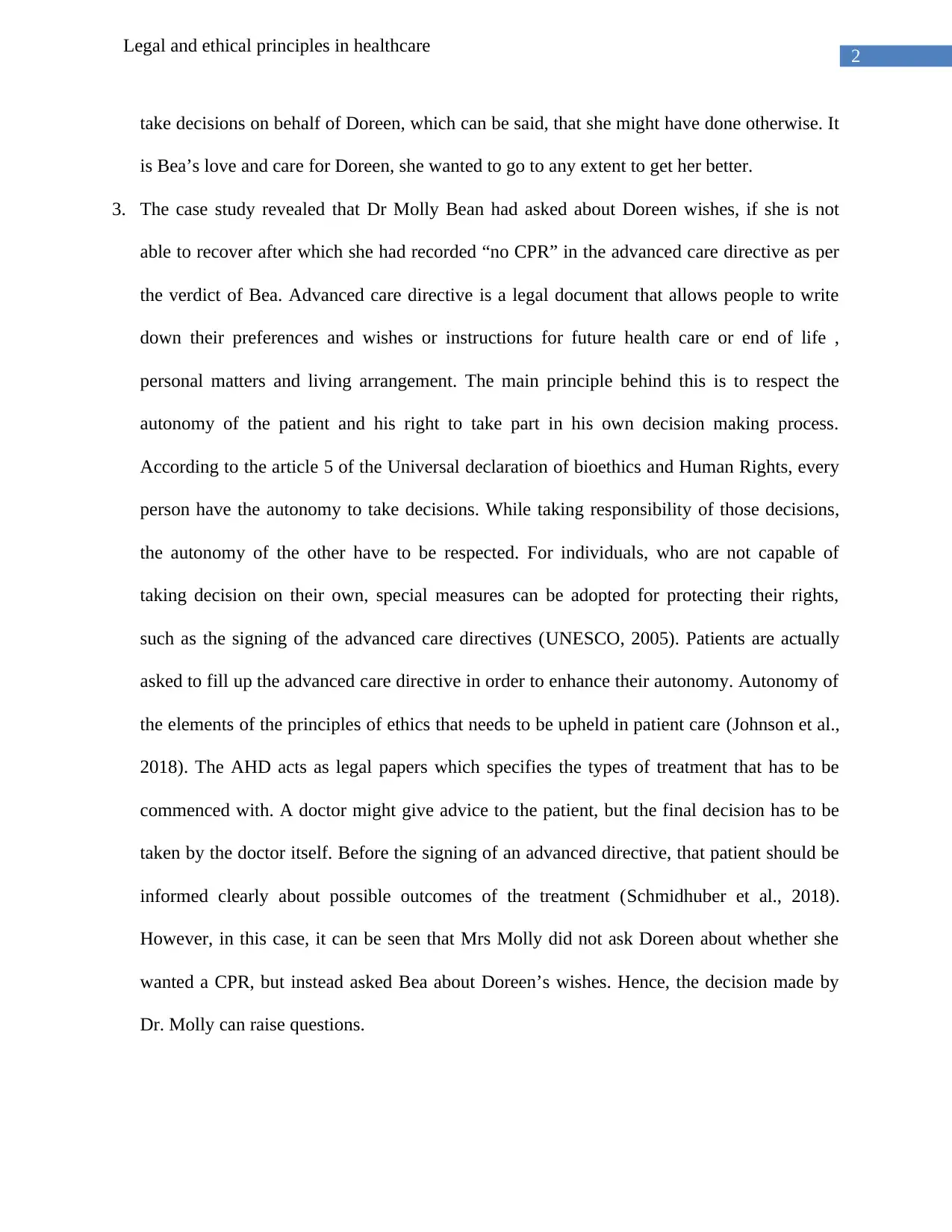
2
Legal and ethical principles in healthcare
take decisions on behalf of Doreen, which can be said, that she might have done otherwise. It
is Bea’s love and care for Doreen, she wanted to go to any extent to get her better.
3. The case study revealed that Dr Molly Bean had asked about Doreen wishes, if she is not
able to recover after which she had recorded “no CPR” in the advanced care directive as per
the verdict of Bea. Advanced care directive is a legal document that allows people to write
down their preferences and wishes or instructions for future health care or end of life ,
personal matters and living arrangement. The main principle behind this is to respect the
autonomy of the patient and his right to take part in his own decision making process.
According to the article 5 of the Universal declaration of bioethics and Human Rights, every
person have the autonomy to take decisions. While taking responsibility of those decisions,
the autonomy of the other have to be respected. For individuals, who are not capable of
taking decision on their own, special measures can be adopted for protecting their rights,
such as the signing of the advanced care directives (UNESCO, 2005). Patients are actually
asked to fill up the advanced care directive in order to enhance their autonomy. Autonomy of
the elements of the principles of ethics that needs to be upheld in patient care (Johnson et al.,
2018). The AHD acts as legal papers which specifies the types of treatment that has to be
commenced with. A doctor might give advice to the patient, but the final decision has to be
taken by the doctor itself. Before the signing of an advanced directive, that patient should be
informed clearly about possible outcomes of the treatment (Schmidhuber et al., 2018).
However, in this case, it can be seen that Mrs Molly did not ask Doreen about whether she
wanted a CPR, but instead asked Bea about Doreen’s wishes. Hence, the decision made by
Dr. Molly can raise questions.
Legal and ethical principles in healthcare
take decisions on behalf of Doreen, which can be said, that she might have done otherwise. It
is Bea’s love and care for Doreen, she wanted to go to any extent to get her better.
3. The case study revealed that Dr Molly Bean had asked about Doreen wishes, if she is not
able to recover after which she had recorded “no CPR” in the advanced care directive as per
the verdict of Bea. Advanced care directive is a legal document that allows people to write
down their preferences and wishes or instructions for future health care or end of life ,
personal matters and living arrangement. The main principle behind this is to respect the
autonomy of the patient and his right to take part in his own decision making process.
According to the article 5 of the Universal declaration of bioethics and Human Rights, every
person have the autonomy to take decisions. While taking responsibility of those decisions,
the autonomy of the other have to be respected. For individuals, who are not capable of
taking decision on their own, special measures can be adopted for protecting their rights,
such as the signing of the advanced care directives (UNESCO, 2005). Patients are actually
asked to fill up the advanced care directive in order to enhance their autonomy. Autonomy of
the elements of the principles of ethics that needs to be upheld in patient care (Johnson et al.,
2018). The AHD acts as legal papers which specifies the types of treatment that has to be
commenced with. A doctor might give advice to the patient, but the final decision has to be
taken by the doctor itself. Before the signing of an advanced directive, that patient should be
informed clearly about possible outcomes of the treatment (Schmidhuber et al., 2018).
However, in this case, it can be seen that Mrs Molly did not ask Doreen about whether she
wanted a CPR, but instead asked Bea about Doreen’s wishes. Hence, the decision made by
Dr. Molly can raise questions.
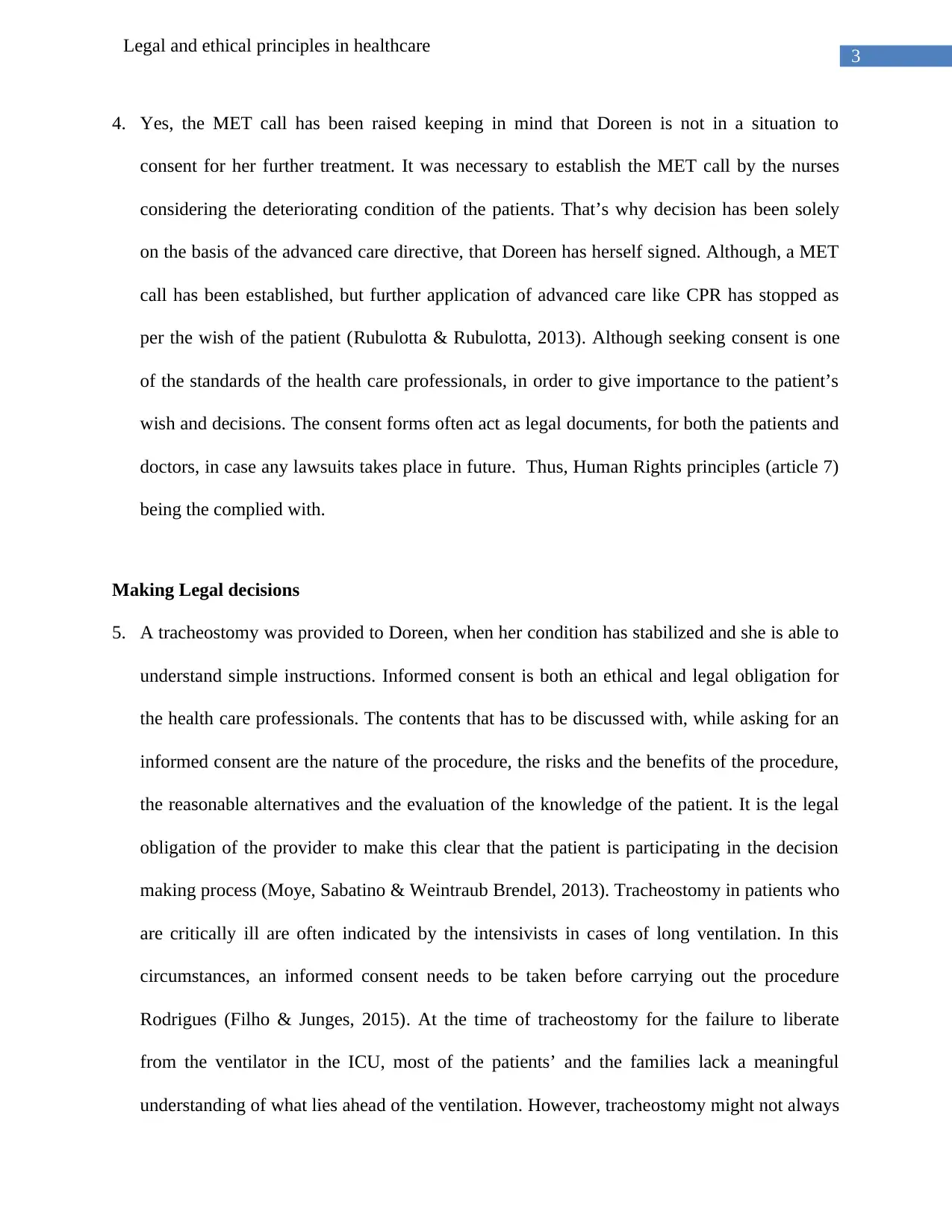
3
Legal and ethical principles in healthcare
4. Yes, the MET call has been raised keeping in mind that Doreen is not in a situation to
consent for her further treatment. It was necessary to establish the MET call by the nurses
considering the deteriorating condition of the patients. That’s why decision has been solely
on the basis of the advanced care directive, that Doreen has herself signed. Although, a MET
call has been established, but further application of advanced care like CPR has stopped as
per the wish of the patient (Rubulotta & Rubulotta, 2013). Although seeking consent is one
of the standards of the health care professionals, in order to give importance to the patient’s
wish and decisions. The consent forms often act as legal documents, for both the patients and
doctors, in case any lawsuits takes place in future. Thus, Human Rights principles (article 7)
being the complied with.
Making Legal decisions
5. A tracheostomy was provided to Doreen, when her condition has stabilized and she is able to
understand simple instructions. Informed consent is both an ethical and legal obligation for
the health care professionals. The contents that has to be discussed with, while asking for an
informed consent are the nature of the procedure, the risks and the benefits of the procedure,
the reasonable alternatives and the evaluation of the knowledge of the patient. It is the legal
obligation of the provider to make this clear that the patient is participating in the decision
making process (Moye, Sabatino & Weintraub Brendel, 2013). Tracheostomy in patients who
are critically ill are often indicated by the intensivists in cases of long ventilation. In this
circumstances, an informed consent needs to be taken before carrying out the procedure
Rodrigues (Filho & Junges, 2015). At the time of tracheostomy for the failure to liberate
from the ventilator in the ICU, most of the patients’ and the families lack a meaningful
understanding of what lies ahead of the ventilation. However, tracheostomy might not always
Legal and ethical principles in healthcare
4. Yes, the MET call has been raised keeping in mind that Doreen is not in a situation to
consent for her further treatment. It was necessary to establish the MET call by the nurses
considering the deteriorating condition of the patients. That’s why decision has been solely
on the basis of the advanced care directive, that Doreen has herself signed. Although, a MET
call has been established, but further application of advanced care like CPR has stopped as
per the wish of the patient (Rubulotta & Rubulotta, 2013). Although seeking consent is one
of the standards of the health care professionals, in order to give importance to the patient’s
wish and decisions. The consent forms often act as legal documents, for both the patients and
doctors, in case any lawsuits takes place in future. Thus, Human Rights principles (article 7)
being the complied with.
Making Legal decisions
5. A tracheostomy was provided to Doreen, when her condition has stabilized and she is able to
understand simple instructions. Informed consent is both an ethical and legal obligation for
the health care professionals. The contents that has to be discussed with, while asking for an
informed consent are the nature of the procedure, the risks and the benefits of the procedure,
the reasonable alternatives and the evaluation of the knowledge of the patient. It is the legal
obligation of the provider to make this clear that the patient is participating in the decision
making process (Moye, Sabatino & Weintraub Brendel, 2013). Tracheostomy in patients who
are critically ill are often indicated by the intensivists in cases of long ventilation. In this
circumstances, an informed consent needs to be taken before carrying out the procedure
Rodrigues (Filho & Junges, 2015). At the time of tracheostomy for the failure to liberate
from the ventilator in the ICU, most of the patients’ and the families lack a meaningful
understanding of what lies ahead of the ventilation. However, tracheostomy might not always
Secure Best Marks with AI Grader
Need help grading? Try our AI Grader for instant feedback on your assignments.
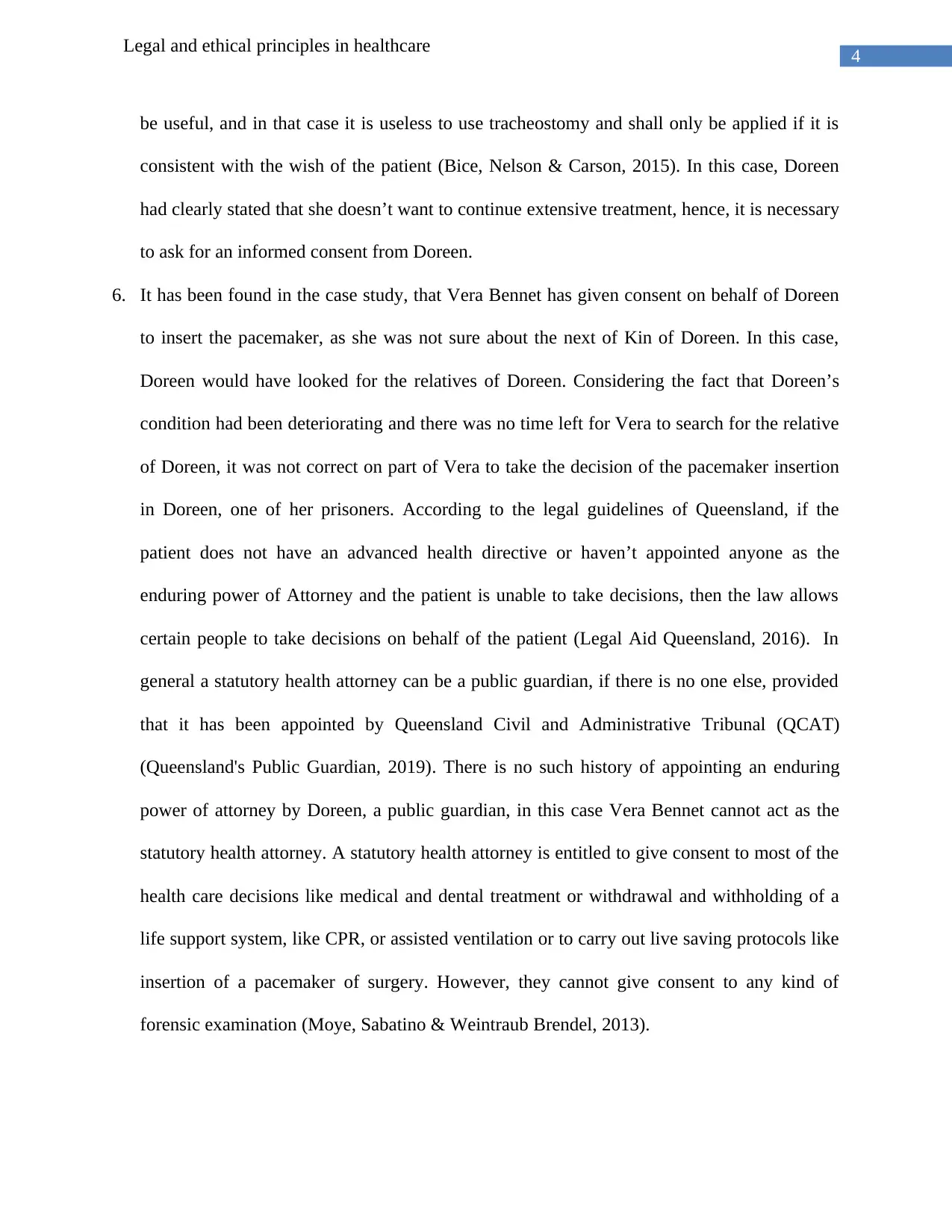
4
Legal and ethical principles in healthcare
be useful, and in that case it is useless to use tracheostomy and shall only be applied if it is
consistent with the wish of the patient (Bice, Nelson & Carson, 2015). In this case, Doreen
had clearly stated that she doesn’t want to continue extensive treatment, hence, it is necessary
to ask for an informed consent from Doreen.
6. It has been found in the case study, that Vera Bennet has given consent on behalf of Doreen
to insert the pacemaker, as she was not sure about the next of Kin of Doreen. In this case,
Doreen would have looked for the relatives of Doreen. Considering the fact that Doreen’s
condition had been deteriorating and there was no time left for Vera to search for the relative
of Doreen, it was not correct on part of Vera to take the decision of the pacemaker insertion
in Doreen, one of her prisoners. According to the legal guidelines of Queensland, if the
patient does not have an advanced health directive or haven’t appointed anyone as the
enduring power of Attorney and the patient is unable to take decisions, then the law allows
certain people to take decisions on behalf of the patient (Legal Aid Queensland, 2016). In
general a statutory health attorney can be a public guardian, if there is no one else, provided
that it has been appointed by Queensland Civil and Administrative Tribunal (QCAT)
(Queensland's Public Guardian, 2019). There is no such history of appointing an enduring
power of attorney by Doreen, a public guardian, in this case Vera Bennet cannot act as the
statutory health attorney. A statutory health attorney is entitled to give consent to most of the
health care decisions like medical and dental treatment or withdrawal and withholding of a
life support system, like CPR, or assisted ventilation or to carry out live saving protocols like
insertion of a pacemaker of surgery. However, they cannot give consent to any kind of
forensic examination (Moye, Sabatino & Weintraub Brendel, 2013).
Legal and ethical principles in healthcare
be useful, and in that case it is useless to use tracheostomy and shall only be applied if it is
consistent with the wish of the patient (Bice, Nelson & Carson, 2015). In this case, Doreen
had clearly stated that she doesn’t want to continue extensive treatment, hence, it is necessary
to ask for an informed consent from Doreen.
6. It has been found in the case study, that Vera Bennet has given consent on behalf of Doreen
to insert the pacemaker, as she was not sure about the next of Kin of Doreen. In this case,
Doreen would have looked for the relatives of Doreen. Considering the fact that Doreen’s
condition had been deteriorating and there was no time left for Vera to search for the relative
of Doreen, it was not correct on part of Vera to take the decision of the pacemaker insertion
in Doreen, one of her prisoners. According to the legal guidelines of Queensland, if the
patient does not have an advanced health directive or haven’t appointed anyone as the
enduring power of Attorney and the patient is unable to take decisions, then the law allows
certain people to take decisions on behalf of the patient (Legal Aid Queensland, 2016). In
general a statutory health attorney can be a public guardian, if there is no one else, provided
that it has been appointed by Queensland Civil and Administrative Tribunal (QCAT)
(Queensland's Public Guardian, 2019). There is no such history of appointing an enduring
power of attorney by Doreen, a public guardian, in this case Vera Bennet cannot act as the
statutory health attorney. A statutory health attorney is entitled to give consent to most of the
health care decisions like medical and dental treatment or withdrawal and withholding of a
life support system, like CPR, or assisted ventilation or to carry out live saving protocols like
insertion of a pacemaker of surgery. However, they cannot give consent to any kind of
forensic examination (Moye, Sabatino & Weintraub Brendel, 2013).
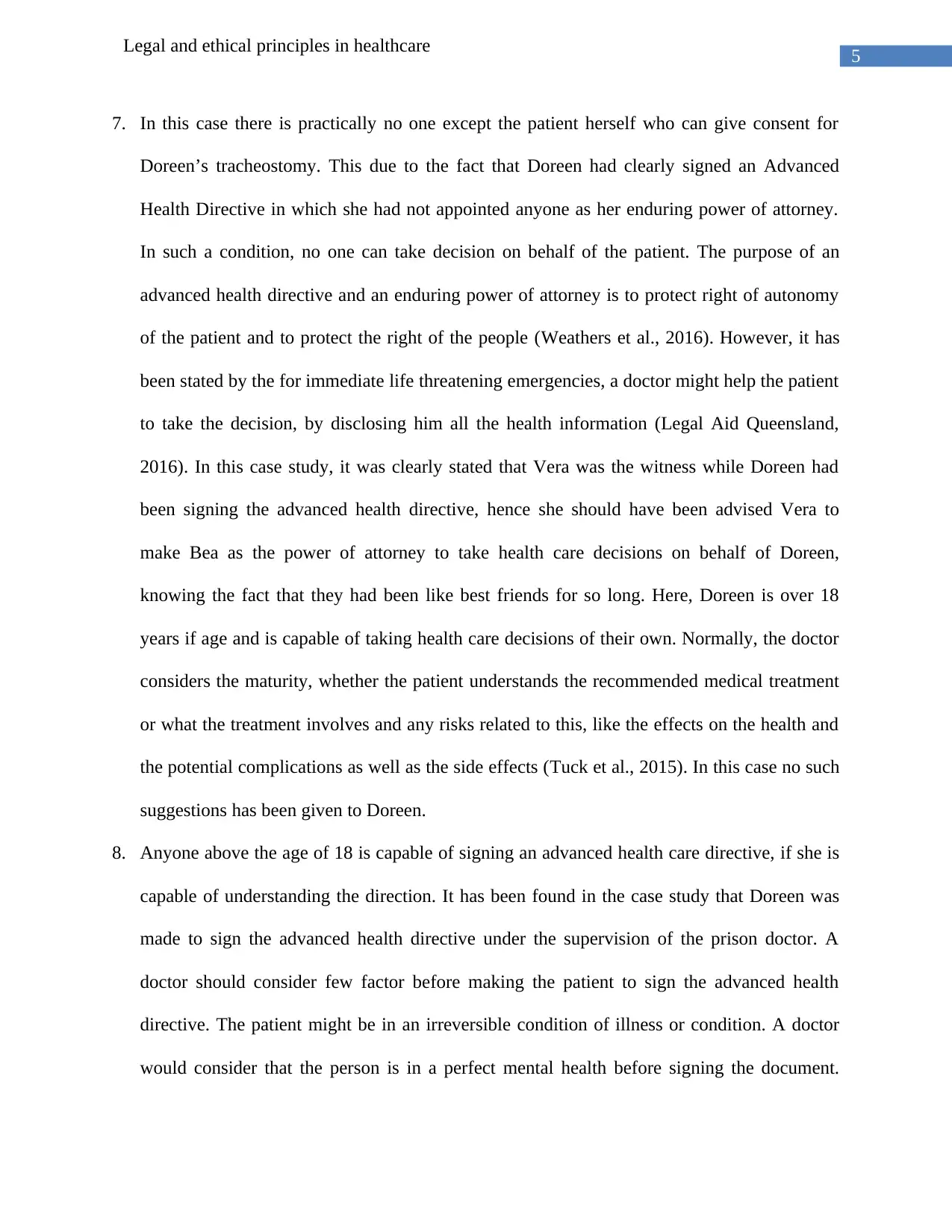
5
Legal and ethical principles in healthcare
7. In this case there is practically no one except the patient herself who can give consent for
Doreen’s tracheostomy. This due to the fact that Doreen had clearly signed an Advanced
Health Directive in which she had not appointed anyone as her enduring power of attorney.
In such a condition, no one can take decision on behalf of the patient. The purpose of an
advanced health directive and an enduring power of attorney is to protect right of autonomy
of the patient and to protect the right of the people (Weathers et al., 2016). However, it has
been stated by the for immediate life threatening emergencies, a doctor might help the patient
to take the decision, by disclosing him all the health information (Legal Aid Queensland,
2016). In this case study, it was clearly stated that Vera was the witness while Doreen had
been signing the advanced health directive, hence she should have been advised Vera to
make Bea as the power of attorney to take health care decisions on behalf of Doreen,
knowing the fact that they had been like best friends for so long. Here, Doreen is over 18
years if age and is capable of taking health care decisions of their own. Normally, the doctor
considers the maturity, whether the patient understands the recommended medical treatment
or what the treatment involves and any risks related to this, like the effects on the health and
the potential complications as well as the side effects (Tuck et al., 2015). In this case no such
suggestions has been given to Doreen.
8. Anyone above the age of 18 is capable of signing an advanced health care directive, if she is
capable of understanding the direction. It has been found in the case study that Doreen was
made to sign the advanced health directive under the supervision of the prison doctor. A
doctor should consider few factor before making the patient to sign the advanced health
directive. The patient might be in an irreversible condition of illness or condition. A doctor
would consider that the person is in a perfect mental health before signing the document.
Legal and ethical principles in healthcare
7. In this case there is practically no one except the patient herself who can give consent for
Doreen’s tracheostomy. This due to the fact that Doreen had clearly signed an Advanced
Health Directive in which she had not appointed anyone as her enduring power of attorney.
In such a condition, no one can take decision on behalf of the patient. The purpose of an
advanced health directive and an enduring power of attorney is to protect right of autonomy
of the patient and to protect the right of the people (Weathers et al., 2016). However, it has
been stated by the for immediate life threatening emergencies, a doctor might help the patient
to take the decision, by disclosing him all the health information (Legal Aid Queensland,
2016). In this case study, it was clearly stated that Vera was the witness while Doreen had
been signing the advanced health directive, hence she should have been advised Vera to
make Bea as the power of attorney to take health care decisions on behalf of Doreen,
knowing the fact that they had been like best friends for so long. Here, Doreen is over 18
years if age and is capable of taking health care decisions of their own. Normally, the doctor
considers the maturity, whether the patient understands the recommended medical treatment
or what the treatment involves and any risks related to this, like the effects on the health and
the potential complications as well as the side effects (Tuck et al., 2015). In this case no such
suggestions has been given to Doreen.
8. Anyone above the age of 18 is capable of signing an advanced health care directive, if she is
capable of understanding the direction. It has been found in the case study that Doreen was
made to sign the advanced health directive under the supervision of the prison doctor. A
doctor should consider few factor before making the patient to sign the advanced health
directive. The patient might be in an irreversible condition of illness or condition. A doctor
would consider that the person is in a perfect mental health before signing the document.
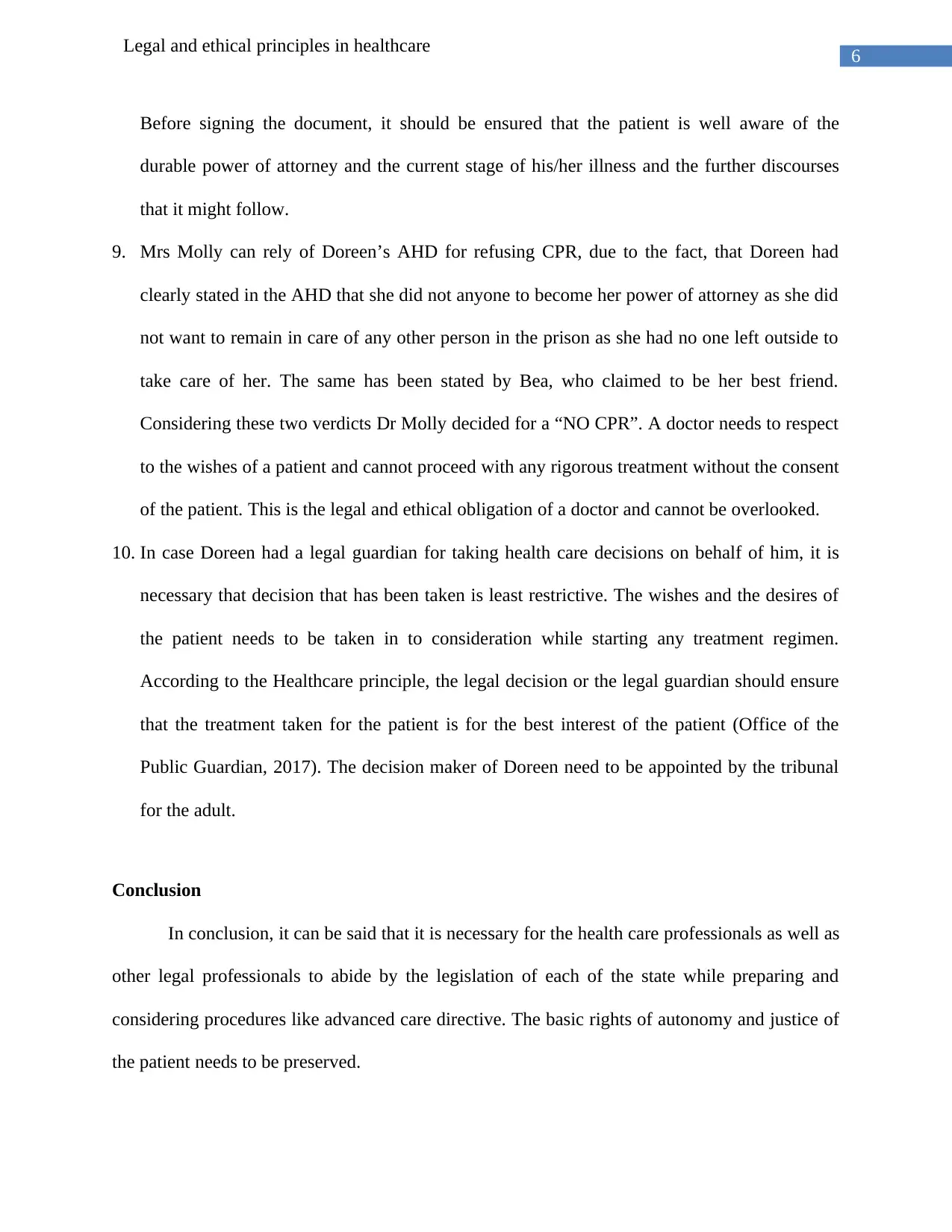
6
Legal and ethical principles in healthcare
Before signing the document, it should be ensured that the patient is well aware of the
durable power of attorney and the current stage of his/her illness and the further discourses
that it might follow.
9. Mrs Molly can rely of Doreen’s AHD for refusing CPR, due to the fact, that Doreen had
clearly stated in the AHD that she did not anyone to become her power of attorney as she did
not want to remain in care of any other person in the prison as she had no one left outside to
take care of her. The same has been stated by Bea, who claimed to be her best friend.
Considering these two verdicts Dr Molly decided for a “NO CPR”. A doctor needs to respect
to the wishes of a patient and cannot proceed with any rigorous treatment without the consent
of the patient. This is the legal and ethical obligation of a doctor and cannot be overlooked.
10. In case Doreen had a legal guardian for taking health care decisions on behalf of him, it is
necessary that decision that has been taken is least restrictive. The wishes and the desires of
the patient needs to be taken in to consideration while starting any treatment regimen.
According to the Healthcare principle, the legal decision or the legal guardian should ensure
that the treatment taken for the patient is for the best interest of the patient (Office of the
Public Guardian, 2017). The decision maker of Doreen need to be appointed by the tribunal
for the adult.
Conclusion
In conclusion, it can be said that it is necessary for the health care professionals as well as
other legal professionals to abide by the legislation of each of the state while preparing and
considering procedures like advanced care directive. The basic rights of autonomy and justice of
the patient needs to be preserved.
Legal and ethical principles in healthcare
Before signing the document, it should be ensured that the patient is well aware of the
durable power of attorney and the current stage of his/her illness and the further discourses
that it might follow.
9. Mrs Molly can rely of Doreen’s AHD for refusing CPR, due to the fact, that Doreen had
clearly stated in the AHD that she did not anyone to become her power of attorney as she did
not want to remain in care of any other person in the prison as she had no one left outside to
take care of her. The same has been stated by Bea, who claimed to be her best friend.
Considering these two verdicts Dr Molly decided for a “NO CPR”. A doctor needs to respect
to the wishes of a patient and cannot proceed with any rigorous treatment without the consent
of the patient. This is the legal and ethical obligation of a doctor and cannot be overlooked.
10. In case Doreen had a legal guardian for taking health care decisions on behalf of him, it is
necessary that decision that has been taken is least restrictive. The wishes and the desires of
the patient needs to be taken in to consideration while starting any treatment regimen.
According to the Healthcare principle, the legal decision or the legal guardian should ensure
that the treatment taken for the patient is for the best interest of the patient (Office of the
Public Guardian, 2017). The decision maker of Doreen need to be appointed by the tribunal
for the adult.
Conclusion
In conclusion, it can be said that it is necessary for the health care professionals as well as
other legal professionals to abide by the legislation of each of the state while preparing and
considering procedures like advanced care directive. The basic rights of autonomy and justice of
the patient needs to be preserved.
Paraphrase This Document
Need a fresh take? Get an instant paraphrase of this document with our AI Paraphraser

7
Legal and ethical principles in healthcare
Legal and ethical principles in healthcare
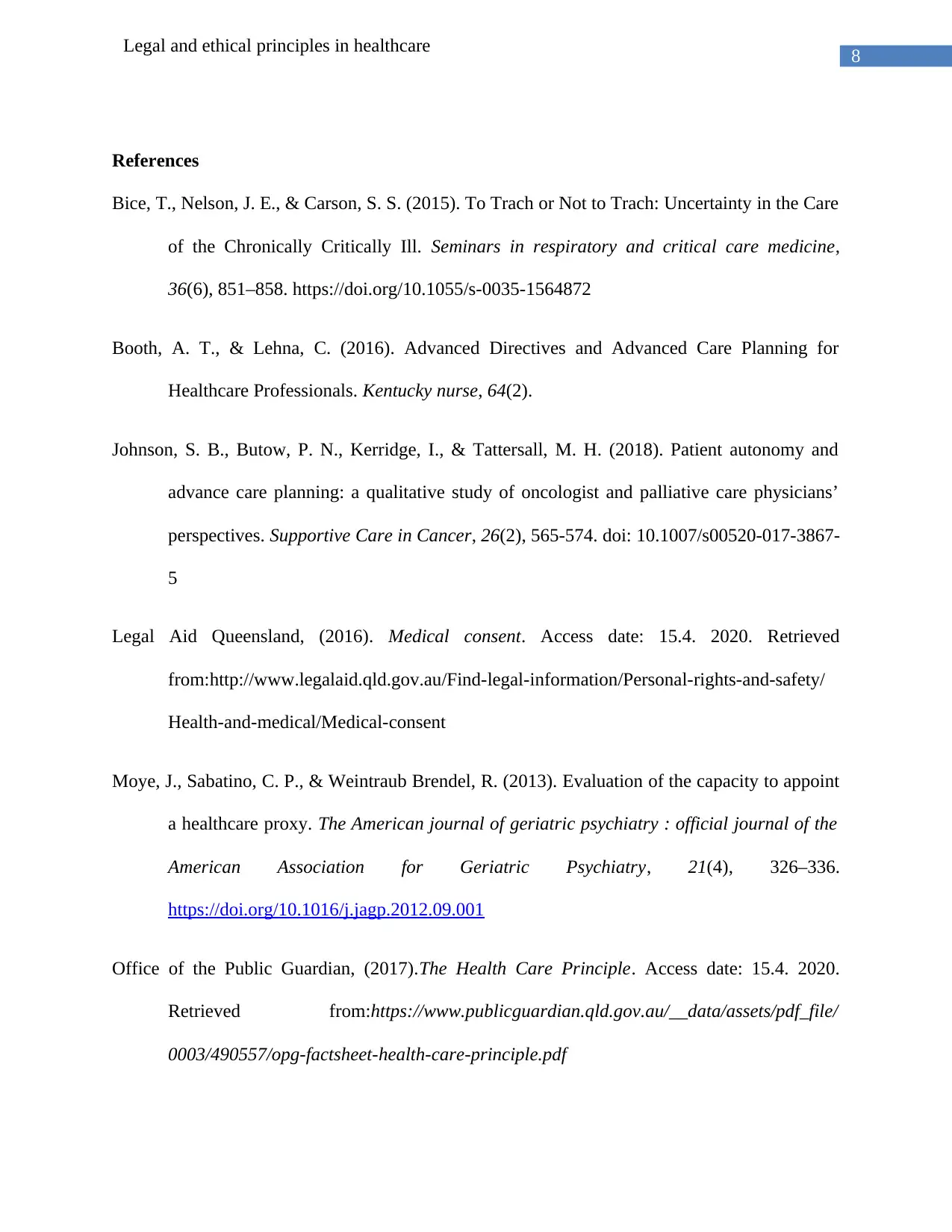
8
Legal and ethical principles in healthcare
References
Bice, T., Nelson, J. E., & Carson, S. S. (2015). To Trach or Not to Trach: Uncertainty in the Care
of the Chronically Critically Ill. Seminars in respiratory and critical care medicine,
36(6), 851–858. https://doi.org/10.1055/s-0035-1564872
Booth, A. T., & Lehna, C. (2016). Advanced Directives and Advanced Care Planning for
Healthcare Professionals. Kentucky nurse, 64(2).
Johnson, S. B., Butow, P. N., Kerridge, I., & Tattersall, M. H. (2018). Patient autonomy and
advance care planning: a qualitative study of oncologist and palliative care physicians’
perspectives. Supportive Care in Cancer, 26(2), 565-574. doi: 10.1007/s00520-017-3867-
5
Legal Aid Queensland, (2016). Medical consent. Access date: 15.4. 2020. Retrieved
from:http://www.legalaid.qld.gov.au/Find-legal-information/Personal-rights-and-safety/
Health-and-medical/Medical-consent
Moye, J., Sabatino, C. P., & Weintraub Brendel, R. (2013). Evaluation of the capacity to appoint
a healthcare proxy. The American journal of geriatric psychiatry : official journal of the
American Association for Geriatric Psychiatry, 21(4), 326–336.
https://doi.org/10.1016/j.jagp.2012.09.001
Office of the Public Guardian, (2017).The Health Care Principle. Access date: 15.4. 2020.
Retrieved from:https://www.publicguardian.qld.gov.au/__data/assets/pdf_file/
0003/490557/opg-factsheet-health-care-principle.pdf
Legal and ethical principles in healthcare
References
Bice, T., Nelson, J. E., & Carson, S. S. (2015). To Trach or Not to Trach: Uncertainty in the Care
of the Chronically Critically Ill. Seminars in respiratory and critical care medicine,
36(6), 851–858. https://doi.org/10.1055/s-0035-1564872
Booth, A. T., & Lehna, C. (2016). Advanced Directives and Advanced Care Planning for
Healthcare Professionals. Kentucky nurse, 64(2).
Johnson, S. B., Butow, P. N., Kerridge, I., & Tattersall, M. H. (2018). Patient autonomy and
advance care planning: a qualitative study of oncologist and palliative care physicians’
perspectives. Supportive Care in Cancer, 26(2), 565-574. doi: 10.1007/s00520-017-3867-
5
Legal Aid Queensland, (2016). Medical consent. Access date: 15.4. 2020. Retrieved
from:http://www.legalaid.qld.gov.au/Find-legal-information/Personal-rights-and-safety/
Health-and-medical/Medical-consent
Moye, J., Sabatino, C. P., & Weintraub Brendel, R. (2013). Evaluation of the capacity to appoint
a healthcare proxy. The American journal of geriatric psychiatry : official journal of the
American Association for Geriatric Psychiatry, 21(4), 326–336.
https://doi.org/10.1016/j.jagp.2012.09.001
Office of the Public Guardian, (2017).The Health Care Principle. Access date: 15.4. 2020.
Retrieved from:https://www.publicguardian.qld.gov.au/__data/assets/pdf_file/
0003/490557/opg-factsheet-health-care-principle.pdf
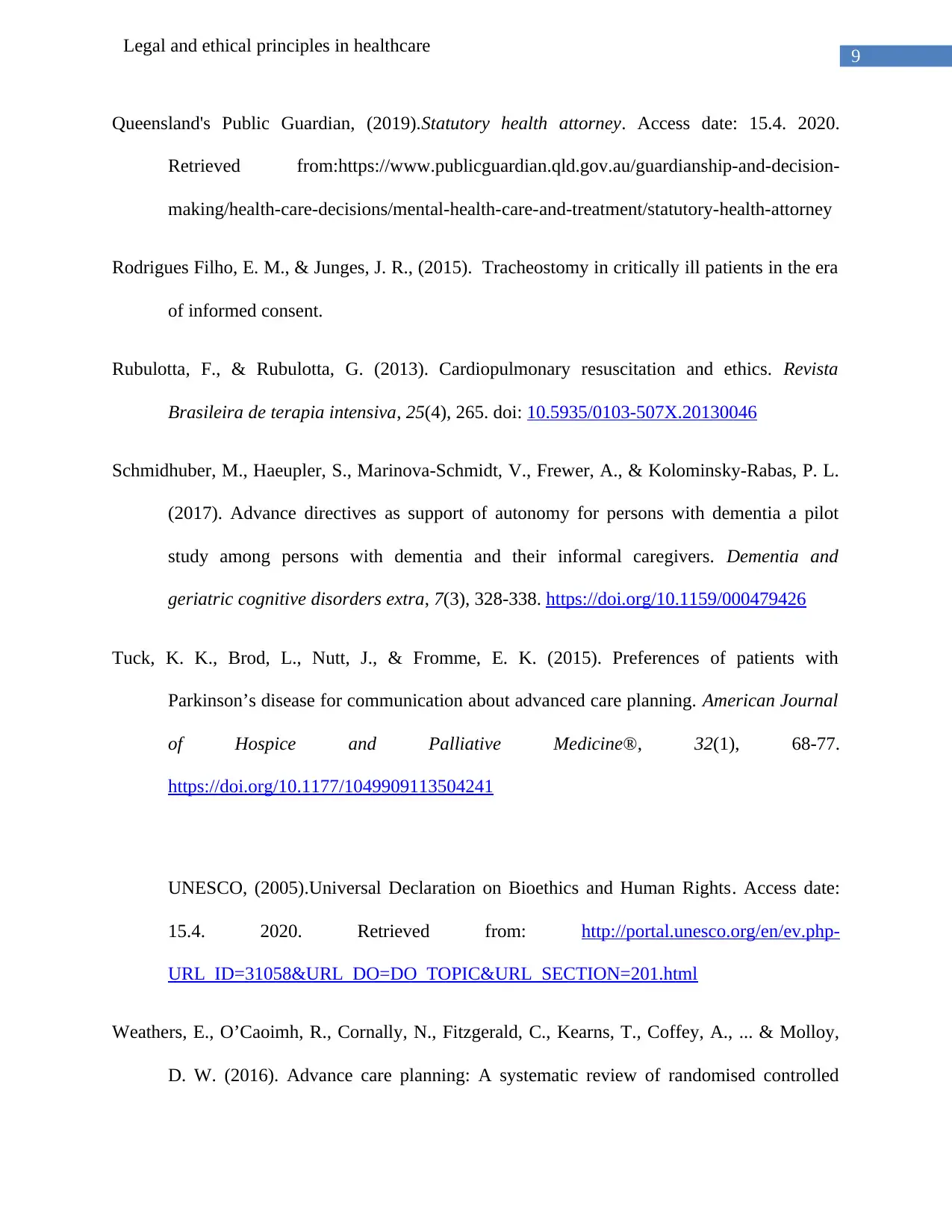
9
Legal and ethical principles in healthcare
Queensland's Public Guardian, (2019).Statutory health attorney. Access date: 15.4. 2020.
Retrieved from:https://www.publicguardian.qld.gov.au/guardianship-and-decision-
making/health-care-decisions/mental-health-care-and-treatment/statutory-health-attorney
Rodrigues Filho, E. M., & Junges, J. R., (2015). Tracheostomy in critically ill patients in the era
of informed consent.
Rubulotta, F., & Rubulotta, G. (2013). Cardiopulmonary resuscitation and ethics. Revista
Brasileira de terapia intensiva, 25(4), 265. doi: 10.5935/0103-507X.20130046
Schmidhuber, M., Haeupler, S., Marinova-Schmidt, V., Frewer, A., & Kolominsky-Rabas, P. L.
(2017). Advance directives as support of autonomy for persons with dementia a pilot
study among persons with dementia and their informal caregivers. Dementia and
geriatric cognitive disorders extra, 7(3), 328-338. https://doi.org/10.1159/000479426
Tuck, K. K., Brod, L., Nutt, J., & Fromme, E. K. (2015). Preferences of patients with
Parkinson’s disease for communication about advanced care planning. American Journal
of Hospice and Palliative Medicine®, 32(1), 68-77.
https://doi.org/10.1177/1049909113504241
UNESCO, (2005).Universal Declaration on Bioethics and Human Rights. Access date:
15.4. 2020. Retrieved from: http://portal.unesco.org/en/ev.php-
URL_ID=31058&URL_DO=DO_TOPIC&URL_SECTION=201.html
Weathers, E., O’Caoimh, R., Cornally, N., Fitzgerald, C., Kearns, T., Coffey, A., ... & Molloy,
D. W. (2016). Advance care planning: A systematic review of randomised controlled
Legal and ethical principles in healthcare
Queensland's Public Guardian, (2019).Statutory health attorney. Access date: 15.4. 2020.
Retrieved from:https://www.publicguardian.qld.gov.au/guardianship-and-decision-
making/health-care-decisions/mental-health-care-and-treatment/statutory-health-attorney
Rodrigues Filho, E. M., & Junges, J. R., (2015). Tracheostomy in critically ill patients in the era
of informed consent.
Rubulotta, F., & Rubulotta, G. (2013). Cardiopulmonary resuscitation and ethics. Revista
Brasileira de terapia intensiva, 25(4), 265. doi: 10.5935/0103-507X.20130046
Schmidhuber, M., Haeupler, S., Marinova-Schmidt, V., Frewer, A., & Kolominsky-Rabas, P. L.
(2017). Advance directives as support of autonomy for persons with dementia a pilot
study among persons with dementia and their informal caregivers. Dementia and
geriatric cognitive disorders extra, 7(3), 328-338. https://doi.org/10.1159/000479426
Tuck, K. K., Brod, L., Nutt, J., & Fromme, E. K. (2015). Preferences of patients with
Parkinson’s disease for communication about advanced care planning. American Journal
of Hospice and Palliative Medicine®, 32(1), 68-77.
https://doi.org/10.1177/1049909113504241
UNESCO, (2005).Universal Declaration on Bioethics and Human Rights. Access date:
15.4. 2020. Retrieved from: http://portal.unesco.org/en/ev.php-
URL_ID=31058&URL_DO=DO_TOPIC&URL_SECTION=201.html
Weathers, E., O’Caoimh, R., Cornally, N., Fitzgerald, C., Kearns, T., Coffey, A., ... & Molloy,
D. W. (2016). Advance care planning: A systematic review of randomised controlled
Secure Best Marks with AI Grader
Need help grading? Try our AI Grader for instant feedback on your assignments.

10
Legal and ethical principles in healthcare
trials conducted with older adults. Maturitas, 91, 101-109.
https://doi.org/10.1016/j.maturitas.2016.06.016
Legal and ethical principles in healthcare
trials conducted with older adults. Maturitas, 91, 101-109.
https://doi.org/10.1016/j.maturitas.2016.06.016
1 out of 11
Related Documents
Your All-in-One AI-Powered Toolkit for Academic Success.
+13062052269
info@desklib.com
Available 24*7 on WhatsApp / Email
![[object Object]](/_next/static/media/star-bottom.7253800d.svg)
Unlock your academic potential
© 2024 | Zucol Services PVT LTD | All rights reserved.





